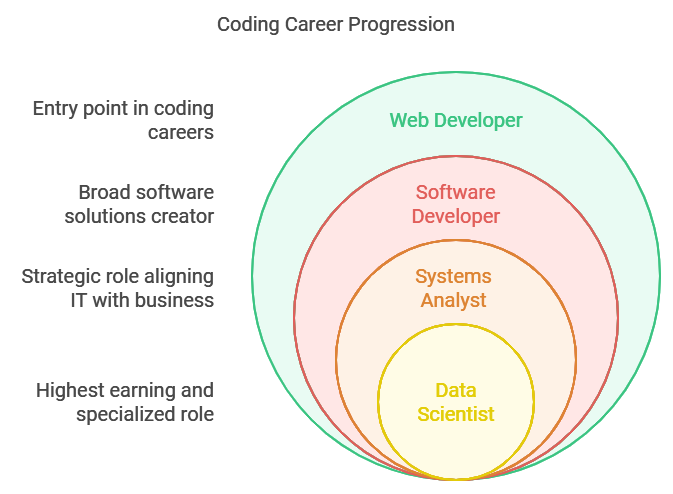Course
Coding is a diverse and highly valued skill, even in the era of ChatGPT, and the technology sector as a whole continues to expand rapidly, with the IT market projected to reach $27 trillion globally by 2032. This growth has also created a strong demand for skilled coders, making it an attractive career path. However, a coder's earning potential varies based on key factors such as their experience level, technical skill set, location, and area of expertise.
In this article, we'll explore what influences coder salaries and how different skills and specializations affect their earnings.
Coding Salaries by Job Title
Since job salaries vary depending on the required skills and job opportunities, let’s see how much coders make a year based on their roles and experience levels:

Coding-related jobs. Source: Image by Author
- Web Developer: As a common entry point into coding careers, web developers with 1-3 years of experience typically earn between $74k to $121k annually. They focus on building and maintaining websites and applications, with opportunities to specialize in front-end (user interface), back-end (server-side), or full-stack development (both).
- Software Developer: With at least two years of industry experience, software developers can earn between $105k to $167k per year. They create and manage a broader range of software solutions that require stronger programming expertise and knowledge of software architecture than web development.
- Systems Analyst: System analysts earn between $109k to $170k annually. They take a more strategic approach by bridging the gap between technical implementation and business needs. They do so by aligning IT systems with business objectives while maintaining quality assurance in software products.
- Data Scientist: Representing one of the highest-paying coding specializations, experienced data scientists with at least three years in the field can earn between $127k to $207k per year. They leverage advanced analytical and machine learning expertise to extract valuable insights from organizational data by combining programming skills with statistical analysis and business acumen.
Factors Affecting Coding Salaries
Generally, there are four main factors that determine how much you can earn as a coder. So, let’s understand each of these factors:
Location
Location plays a huge role in coding salaries. For example, coders in Washington earn $91,320 on average per year, which is the highest compared to other states like Delaware and Louisiana, where the average salary is just around $68k per year. But here's the truth – these higher salaries often come with steeper living costs.
But on the contrary, some unexpected places are becoming tech hotspots. Cities like Austin, Texas and Raleigh, North Carolina, offer strong salaries with much lower living costs. In addition, remote work is also changing the game — coders are earning high salaries while living in more affordable areas.
Experience
Experience does boost your earning potential in coding. For example:
- Entry-level (0-1 year) coders earn around $76k to $124k per year
- Mid-level (4-6 years) coders earn around $91k to $160k per year
- Senior level (15+ years) coders earn around $139k to 258k per year
However, the type of experience matters more than years alone. A developer who has launched successful projects or contributed to major open-source work may earn more than someone with more years but less impactful experience. Some developers with just 5 years of experience in high-demand specialties (like AI or blockchain) can earn as much as traditional senior developers.
Education
Education also impacts your earning potential. According to Zippia, 60% of programmers have a bachelor's degree. Associate degrees are the next most common, with 22% of programmers having one and 10% of programmers possessing a master's degree.
But there’s much more to degrees — while they matter, portfolios often matter more. Many successful developers are self-taught or bootcamp graduates. Companies are increasingly focusing on skills and real-world experience over formal education. Some top tech companies, including Google and Apple, no longer require college degrees for many coding positions.
Industry
Different industries have varying salary potentials. For example, coders in the finance sector, where technical skills are in high demand, can earn around $106,612 on average per year in the U.S. However, if you’re in a healthcare company that relies on technology, you can expect average pay, but it can be lower than in other industries. Similarly, working in the IT industry can give you a chance to get competitive pay, but the competition there would be much higher.
Lesser-known but lucrative sectors include industrial automation and agricultural technology, where coding skills are invaluable and well-compensated.
How to Increase Your Earning Potential as a Coder
Whether you're starting your coding journey or a seasoned developer, there's always room to boost your earning potential. So, if you’re looking to get paid higher, here are some things to keep in mind:
Location matters
As I discussed, different regions have different pay ranges for coders according to their demand. So, start looking for jobs in tech hubs like San Francisco, Seattle, and New York. The cost of living there may be higher, but it is compensated with higher wages. Another great option is finding remote work. This will help you earn competitive salaries while living in areas with lower costs.
Gain hands-on experience
Nothing beats hands-on experience when it comes to growing your earning potential. Take on software projects, internships, and coding bootcamps to build a strong portfolio and highlight your ability to apply coding concepts to real-world problems.
DataCamp offers several courses that provide hands-on exercises in data science and coding which can be a strong addition to your resume. While degrees are valuable, employers particularly value candidates who can demonstrate real-world coding abilities.
You can start with courses like Data Science in Python, and then you can move on to advanced courses like Data Engineering.
Invest in skills and certifications
Continuous learning is key in tech — the more specialized skills you develop, the higher your earning potential becomes. Start by mastering core programming languages like Python and SQL. These fundamentals will be your foundation in tech. From there, explore specialized fields like machine learning, data science, or cybersecurity based on your interests. In addition, learn the best coding practices to have a competitive edge in the market.
Conclusion
Coding offers a promising career path with substantial earning potential, with salaries typically ranging from $76,000 for entry-level positions to over $250,000 for senior roles. Your earning potential depends on multiple factors including location, experience level, education, and industry choice.
While starting salaries are already competitive, coding careers provide excellent opportunities for growth through continuous learning and specialization. So if you’re interested in pursuing this field, invest your time in coding bootcamps and online courses because it can be a valuable first step towards a lucrative career in technology.
I'm a content strategist who loves simplifying complex topics. I’ve helped companies like Splunk, Hackernoon, and Tiiny Host create engaging and informative content for their audiences.



